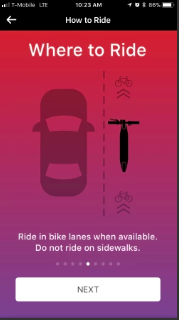The Local newsletter is your free, daily guide to life in Colorado. For locals, by locals. Sign up today!
Last week, electric scooters invaded Denver. Suddenly, in an already bustling downtown, the scooters were everywhere: Weaving through traffic, buzzing around Coors Field, passing pedestrians on sidewalks, and sitting idly in public spaces. The proliferation of scooters—brought to the city by two separate companies, LimeBike and Bird— left some Denver residents thrilled and others a bit puzzled.
The scooters didn’t just bewilder Denver residents—city officials were also caught off guard. On Friday, Denver Public Works (DPW) ordered the immediate removal of these scooters from the public right of way in Denver, says Nancy Kuhn, director of the department’s public information office. According to a statement released Friday by DPW, both companies have been notified that they are in violation of Denver Revised Municipal Code Chapter 49, Article IX, which prohibits utilizing any street, alley, sidewalk, parkway, or other public place for the storage of goods, wares, or merchandise.
That's only $1 per issue!
One of the reasons the scooters violate city code is because they are “dockless,” meaning a scooter can be left anywhere throughout the city. Anyone who downloads the respective Bird or LimeBike App can then find it, ride it, and leave it in a new location. It costs only $1 to activate a scooter, plus an additional 15 cents per minute thereafter. But because of this system, many of the scooters have been left on city sidewalks and trail systems, which DPW prohibits.
Per company policy, Bird retrieves all of its scooters each night and redistributes them the next morning on private property—businesses or personal residences that have given permission for scooters to be docked. Additionally, Bird riders are instructed to leave the scooters near existing bike racks or in places that do not block public rights of way. LimeBike also collects its scooters and charges them every night and redistributes them in “approved” areas, says Mary Caroline Pruitt, the company’s communications manager. She also says LimeBike tries to ensure that the scooters are “parked responsibly” so that they are not blocking pedestrian right-of-way or obstructing any sidewalks or roadways. LimeBike is also working with local businesses so that the company can park scooters on private property.
According to the DPW statement, scooters are not allowed to operate in roadways (except to cross an intersection), nor are they allowed in bike lanes, city trail systems, or in city parks, per city rules and ordinances. Therefore, the scooters are only permitted to be ridden on Denver’s sidewalks “in a controlled fashion,” yielding to pedestrians. However, Bird’s website says users should ride their scooters “in bike lanes when available” and instructs users: “Do not ride on sidewalks.”

The regulations outlined by DPW seemingly give the electric scooter companies very narrow latitude with which to operate, and as such “the city will be removing scooters left unattended in the public right of way to the extent that its resources allow,” the statement says. However, as of Monday morning, unattended scooters could still be found throughout the city. Two Bird scooters were docked outside of the 5280 office on the Wazee Street sidewalk Monday morning and several scooters were still parked along the Cherry Creek Trail on Sunday night.
The dockless scooters first arrived in Denver on May 25, when LimeBike brought its fleet to the city with a goal to help reduce the number of cars on city streets. Kuhn says DPW learned the afternoon of Wednesday, May 23, that LimeBike was going to be dropping 450 scooters in Denver on May 25. Bird then launched its scooter service on Friday, June 1, and according to Kuhn, the city “never received any notice.” Later that day DPW released its statement expressing concern and making clear city ordinances were being violated.
Denver is not the only city dealing with this issue. Similar scooter services are available in Atlanta, Austin, Miami, Washington D.C., and many California cities, and they pose similar concerns. On May 24, San Francisco took measures in response to “disruptive” scooter services, requiring companies to vacate the city until they’d gained a proper permit.
It remains unclear what the future of dockless scooters in Denver will look like. As of Monday, June 4, Bird is still operating in Denver and hopes to work with the city regarding how that service will evolve. Likewise, Pruitt says the company reached out to DPW upon the notification of confiscation of their scooters to “better understand the reasoning behind taking them off the streets and whether there were other ways for the city and our team to effectively and efficiently partner on next steps.” Pruitt also noted that LimeBike wants to collaborate with the city on a regulatory framework that “enables the company to best serve Denver residents and visitors, while also working to overcome the initial community learning curves of a new form of transportation.”
Kuhn says that the city removed five to seven scooters last week and picked up a similar number today. As for penalties for leaving the scooters in public places, “the owner(s) of the scooter(s) may be fined, according to city ordinance,” she says. As for creating a new regulatory framework, Kuhn says the city is “not yet” working with Bird or LimeBike, but is “discussing the next steps.”
Editor’s Note 6/6/2018: This story has been updated with additional information about LimeBike’s policy for collecting and redistributing scooters in public places.







